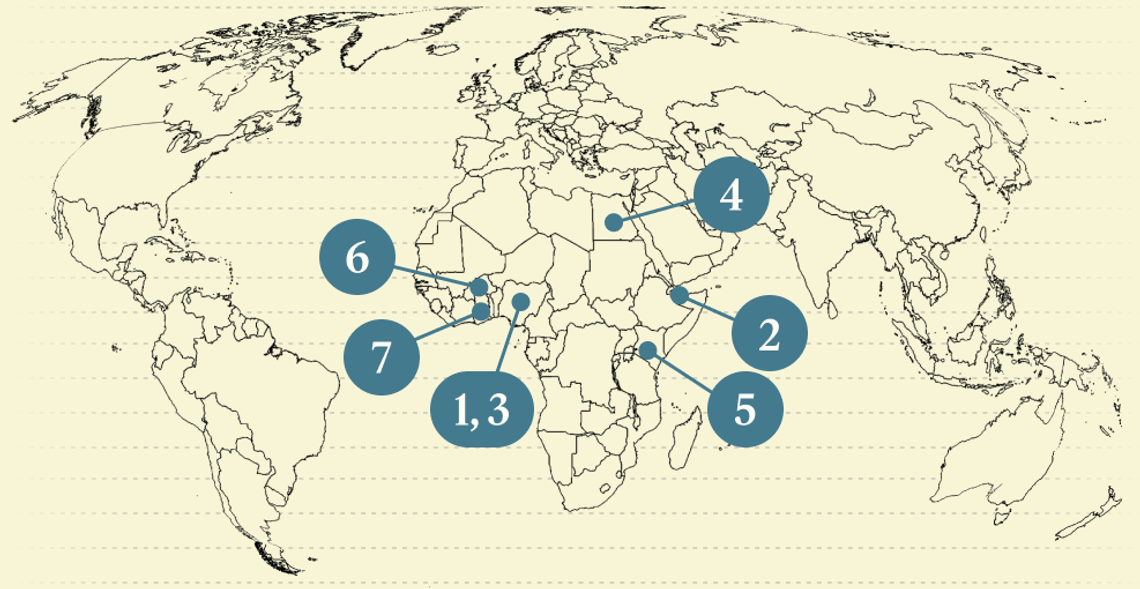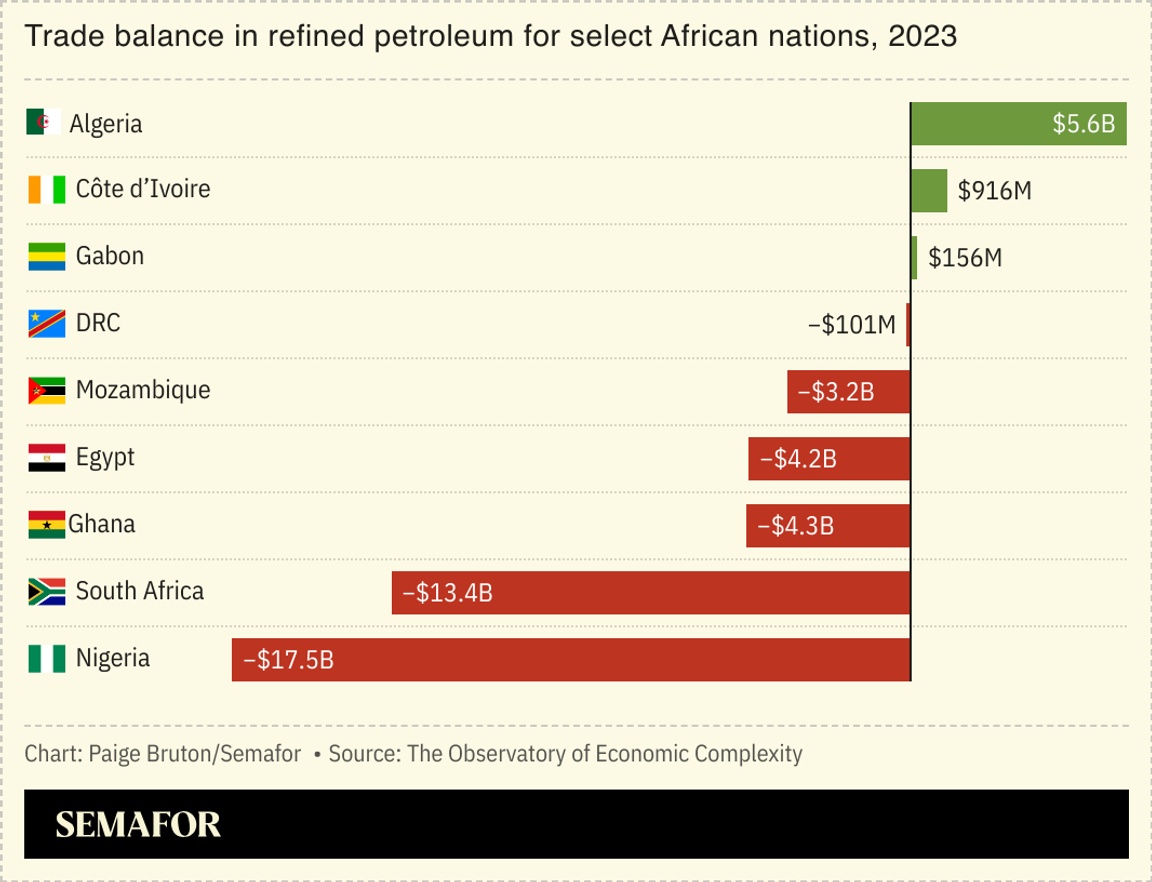| | In this edition: Investing in a Nigerian combat league, Dangote’s refinery fight, Afreximbank’s oil ͏ ͏ ͏ ͏ ͏ ͏ |
| |  | Africa |  |
| |
|
 - A Nigerian combat league
- Somalia-Taiwan tensions
- Dangote’s refinery fight
- Afreximbank’s oil bet
- Kenyan MP shot dead
- Person of Interest
- Weekend Reads
 A new song about surviving the daily gridlock in Lagos. |
|
 Hello! US-Africa policy is under the spotlight like never before given the huge strategic shifts in the first 100 days of Trump 2.0. But the early changes with this administration’s relationship with Africa have felt like the result of wider “America first” objectives, such as slashing foreign aid, rather than any new US approach to the continent. While Africa, as usual, was not a campaign issue last year, Project 2025, the 900-page right-wing think tank policy document widely acknowledged to lay out the framework for President Donald Trump’s return, did have a conservative but mostly conventional US-Africa chapter. One person who has thought a lot about US-Africa policy over the years is Judd Devermont, who was the White House’s senior Africa director under President Joe Biden. He hit the ground running soon after he joined the administration as the primary author of the “US Strategy Toward Sub-Saharan Africa,” which laid out what was touted as a big shift in the United States’ approach after the first Trump term. Now, looking back in a Substack he launched this week, Judd teases “what went wrong” with the lofty goals set in 2022. In truth, he doesn’t really say what was wrong with the Biden Africa policy, but rather looks at the challenges of announcing a strategy in the first place — going all the way back to the Eisenhower administration to examine whether this is the most effective way of implementing US-Africa policy: “Having a strategy is not synonymous with having a successful policy toward Africa. Indeed, Presidents Kennedy and [George W. Bush], in my opinion, had the most impactful records and neither penned a strategy. What matters most is how and why the United States engages.” |
|
Investing in Nigerian boxing |
| | Alexis Akwagyiram and Alexander Onukwue |
| |
 Dambe fighters in Nigeria. Oteikwu Joshua/Wikimedia Commons. Dambe fighters in Nigeria. Oteikwu Joshua/Wikimedia Commons.Nigerian traditional boxing is set to get a boost on the global stage with backing from an African private investment firm and a Hollywood producer. Silverbacks Holdings, a firm domiciled in Mauritius, invested late last year in Nigeria-based sports venture African Warriors Fighting Championship whose major product is Dambe, a centuries-old form of boxing indigenous to the country’s north. Sanford R. Climan, a former Universal Studios executive whose work included producing Martin Scorsese’s The Aviator, is joining Silverbacks as an advisory board member and will personally invest in the outfit, the investment firm said. Ibrahim Sagna, who heads Silverbacks, told Semafor AWFC’s appeal lay in its ability to reach a global audience with a “massive appetite” for combat sport franchises such as UFC [Ultimate Fighting Championship] and PFL [Professional Fighters League]. “You check the valuation of those companies, there’s already a massive demand.” AWFC, which launched in 2019, last month announced a partnership with UK-based sports streaming service DAZN to bring Dambe to a global audience. |
|
 Hargeisa, the capital of Somaliland. Flickr Creative Commons Photo/Retlaw Snellac. Hargeisa, the capital of Somaliland. Flickr Creative Commons Photo/Retlaw Snellac.Somalia’s breakaway region of Somaliland hit out at Mogadishu for banning Taiwan passport-holders from entering or traveling through the East African country. The move by Somalia came days ahead of a planned visit by the Taiwanese foreign minister to Somaliland. Mogadishu also criticized the “unauthorized” establishment of a Taiwan Representative Office in the Somaliland capital Hargeisa. But Somaliland, which declared independence from Somalia in 1991 and is seeking recognition from the international community, said on Thursday that Mogadishu’s statement was “baseless” and threatened regional stability. On Wednesday Beijing, which claims the self-governing island of Taiwan as part of its territory, said: “Taiwan independence separatists blatantly engages in secessionist movement in Somaliland region, which seriously threatens Chinese sovereignty.” Somaliland leaders remain hopeful that the Trump administration will move toward possibly recognizing the region as an independent country, as Semafor first reported last year. |
|
Dangote’s $20B refinery fight |
 Alexander Onukwue/Semafor Alexander Onukwue/SemaforAfrica’s richest man Aliko Dangote vowed to push his $20 billion oil refinery in Nigeria toward full operational capacity, despite what he said were challenges from oil importers seeking to undermine his venture to retain their dominance in the country’s energy sector. The billionaire’s 650,000-barrel-per-day refinery in Lagos state has faced several challenges since it began rolling out petrol to Nigerians in September, struggling even to obtain local crude oil — despite Nigeria being Africa’s top crude oil producer. Dangote, speaking on Thursday at a conference of private equity investors in Lagos, renewed his criticism of groups who “for a very, very long time” have “made a lot of money from” government-subsidized oil imports into Nigeria. Those groups are opposed to his refinery operating easily, Dangote claimed. “We’re fighting and the fight is not yet finished,” he said. “But I have been fighting all my life and I am ready and hundred percent sure I will win at the end of the day.” — Alexander |
|
Afreximbank eyes oil trade |
 The African Export-Import Bank announced a new financing program that could unlock up to $14 billion of additional oil trade on the continent. Afreximbank’s $3 billion initiative seeks to leverage the continent’s nascent but growing refining capacity to facilitate trade between African nations, which represents only a small proportion of the region’s exports. “The continent still imports substantial quantities [of refined oil] from India, the Netherlands, Russia, and China,” David Luke, strategic director at the Firoz Lalji Institute for Africa at the London School of Economics, told Semafor. “In some cases, African countries buy back refined products that they exported as crude at an increased price markup.” — Paige Bruton |
|
Kenyan MP killed in Nairobi |
A Kenyan opposition MP was shot dead in Nairobi in what police said appeared to be a “targeted” attack. Charles Ong’ondo Were had said his life was in danger two months ago, according to local media, but the motive for the murder remains unclear. He was killed by gunmen on a motorcycle near a busy traffic circle often manned by traffic police and “well secured with cameras,” the BBC reported. Kenyan President William Ruto ordered an investigation, saying “those responsible must be held to account.” Were, a legislator for the constituency of Kasipul in western Kenya, was a member of the center-left Orange Democratic Movement. Parliament Speaker Moses Wetang’ula described him as “fearless and distinguished.” |
|
Person of Interest: Ibrahim Traoré |
 Burkina Faso’s President Ibrahim Traoré. Idrissa Ouedraogo, Adama Ouedraogo/AFPTV/AFP via Getty Images. Burkina Faso’s President Ibrahim Traoré. Idrissa Ouedraogo, Adama Ouedraogo/AFPTV/AFP via Getty Images.Burkina Faso’s President Ibrahim Traoré — one of the world’s youngest heads of state — is having a moment. Known at once as the “Prince of the Sahel” and a “dashing poster boy for military rule,” the 37-year-old’s popularity has seemingly surged since he seized power in a 2022 coup: He received the loudest applause of all 21 African heads of state at the Ghanaian president’s inauguration in January, the Pretoria-based Institute for Security Studies noted. And on Wednesday the junta leader drew thousands of supporters in Ouagadougou following an alleged overthrow attempt as well as criticism from a US official. “Long live Captain Traore!” they chanted. Traoré is particularly popular on social media, making waves as far as the Caribbean. “Africa’s Youngest Lion… Defies death, defeats coup plots, and rewrites history,” crooned a headline on the Times Caribbean last week. But the former UN peacekeeper may not be as popular among ordinary citizens as he is commonly portrayed, argued a researcher in The Conversation. “This is inferred from the violent repression of critics, multiple alleged coup attempts as well as the ongoing violence and humanitarian crisis,” Daniel Eizenga said. |
|
 - Working conditions at Meta’s secretive new content-moderating operations in Ghana are “worse in almost every way” than its operations in Kenya, where the firm faces lawsuits over human rights, an investigation by The Bureau of Investigative Journalism found. The US firm had kept its new outsourcing location “a closely guarded secret,” TBIJ wrote, reporting on workers who said that at least one employee was sacked after advocating for better conditions, while others spoke of developing mental illnesses.
- Several African bidders are trying to bring the Formula One Grand Prix back to the continent after more than 30 years since the last race in Johannesburg. Africa today is the only populated continent not on the Grand Prix circuit, Bloomberg reported, calling it “a glaring omission for a global sport that recently added races in Qatar and Azerbaijan.” There is no public list of suitors to host the 2027 event but Morocco, Rwanda, and South Africa are reported to have expressed an interest.
- Tanzanian President Samia Suluhu Hassan’s “facade of reforms” is crumbling as elections draw nearer, a security policy researcher argued in World Politics Review. He cites the arrest last month of the main opposition party’s leader, who was charged with treason, as a sign that “could presage a return to authoritarian rule” in the country. The party, Chadema, was subsequently barred from participating in October’s polls.
- A new generation of chocolatiers in Côte d’Ivoire, the world’s biggest cocoa producer, is worried about the impact of US President Donald Trump’s new tariffs. Though on pause for now, the tariffs have plunged businesses that were eyeing the American market into uncertainty. “We’re a bit lost now,” one artisanal chocolatier, who was in negotiations to export her organic chocolate bars to stores in New York and Washington, told The New York Times.
|
|
Corporate Council on Africa (CCA) is delighted to co-host with the government of the Republic of Angola the 2025 US — Africa Business Summit in Luanda, Angola, June 22 - 25. CCA’s 17th US-Africa Business Summit will bring together more than 1,500 delegates including African presidents, heads of government and ministers, senior US government officials and leaders from US and African companies. The 2025 Summit sessions will cover the full range of opportunities to expand US-Africa trade, investment and business relations. Learn more here. |
|
|